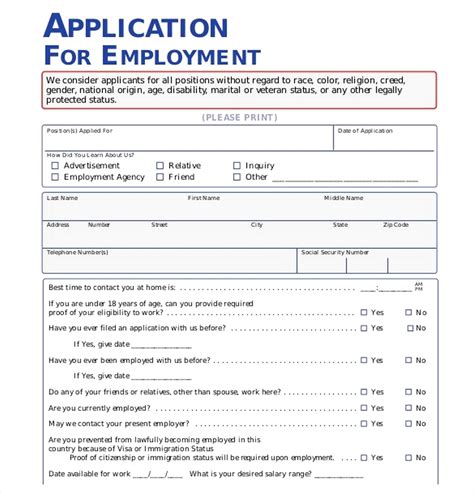Types Of Job Applications: Employer Perspectives

When it comes to recruiting new talent, employers have a variety of job application options to choose from. Each type of application has its own advantages and disadvantages, and understanding the different options can help employers make informed decisions about their hiring processes. In this article, we will explore the various types of job applications from an employer’s perspective, discussing their features, benefits, and best practices.
1. Online Job Applications
With the rise of technology, online job applications have become increasingly popular among both employers and job seekers. Online applications allow employers to streamline their hiring processes, as they can easily receive and manage applications electronically. This type of application is convenient for both parties, as it eliminates the need for physical paperwork and allows for quick and efficient communication.
Benefits of Online Job Applications:
- Time-saving: Online applications can be completed and submitted quickly, saving time for both employers and applicants.
- Ease of use: Online applications are user-friendly and can be accessed from anywhere with an internet connection.
- Automated screening: Online applications often include screening questions that can automatically filter out unqualified candidates.
2. Paper Job Applications
Although online applications have gained popularity, paper applications are still used by many employers, especially in industries where internet access may be limited. Paper applications are physical forms that applicants can fill out by hand and submit in person or via mail. While they may require more manual effort to process, paper applications can still be a viable option for certain employers.
Benefits of Paper Job Applications:
- Accessibility: Paper applications can be distributed to a wider range of individuals, including those without internet access.
- Personal touch: Paper applications allow employers to see an applicant’s handwriting and attention to detail, which can provide additional insights.
- Offline storage: Physical forms can be easily stored and organized for future reference.
3. Email Job Applications
Email job applications involve applicants submitting their resumes and cover letters via email. This method allows employers to receive applications directly in their inbox, making it convenient for them to review and respond to applicants. Email applications are commonly used in professional settings and are especially popular for remote or international job opportunities.
Benefits of Email Job Applications:
- Immediate delivery: Email applications are delivered instantly, allowing employers to review them promptly.
- Cost-effective: Email applications eliminate the need for printing and mailing physical documents.
- Easy organization: Emails can be easily sorted and categorized for efficient processing.
4. Online Forms and Assessments
Some employers use online forms and assessments as part of their job application process. These forms can include various types of questions, such as multiple-choice, essay, or situational judgment questions. Online assessments can help employers gauge an applicant’s skills, knowledge, and compatibility with the role and company culture.
Benefits of Online Forms and Assessments:
- Objective evaluation: Online assessments provide a standardized way to evaluate applicants, reducing biases in the hiring process.
- Efficient screening: Automated scoring and filtering features can quickly identify qualified candidates.
- Insightful data: Online assessments can generate valuable data and insights about applicants, aiding in decision-making.
5. Video Job Applications
Video job applications are a relatively new trend in the hiring process. With video applications, applicants can record and submit a video presentation to showcase their skills, personality, and qualifications. Employers can then review these videos to get a better sense of a candidate before inviting them for an interview.
Benefits of Video Job Applications:
- Visual communication: Video applications allow employers to see and hear candidates, providing a more comprehensive understanding of their suitability.
- Showcasing creativity: Video applications give applicants the opportunity to showcase their creativity and presentation skills.
- Time-saving: Employers can quickly review video applications and narrow down their candidate pool.
Conclusion
Choosing the right type of job application is crucial for employers to attract the best talent and efficiently manage their hiring processes. Online applications, paper applications, email applications, online forms and assessments, and video applications all have their own unique benefits and considerations. Employers should consider their specific needs, industry, and target audience when deciding which application method to use. By utilizing the appropriate job application type, employers can enhance their recruitment efforts and find the most suitable candidates for their organizations.
Frequently Asked Questions
-
Which job application method is the most popular?
The popularity of job application methods varies depending on the industry and geographic location. However, online job applications are becoming increasingly popular due to their convenience and efficiency.
-
Can I use multiple job application methods simultaneously?
Yes, employers can use multiple job application methods simultaneously to attract a diverse pool of candidates and accommodate different preferences.
-
Are paper job applications still relevant in the digital age?
While paper job applications may be less common in certain industries, they can still be relevant for employers who want to reach individuals without internet access or prefer physical documents.
-
How should employers evaluate video job applications?
When evaluating video job applications, employers should focus on the candidate’s communication skills, presentation style, relevant experience, and alignment with the job requirements and company culture.
-
What are the best practices for online forms and assessments?
When using online forms and assessments, employers should ensure that the questions are job-related, fair, and unbiased. It is also important to analyze the data collected and use it as a supplement to other evaluation methods.
